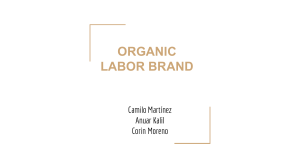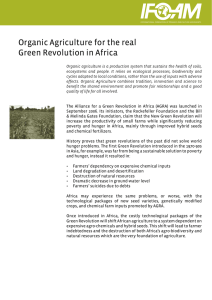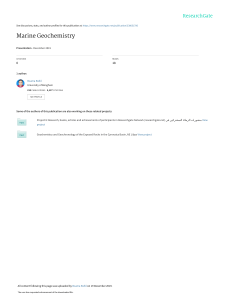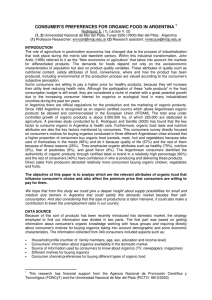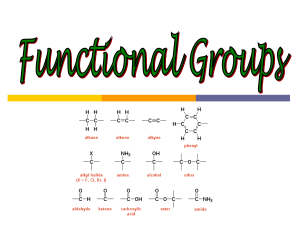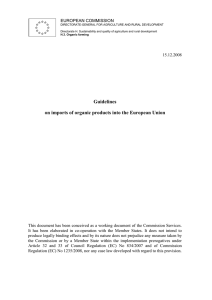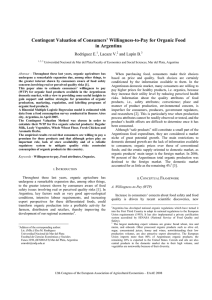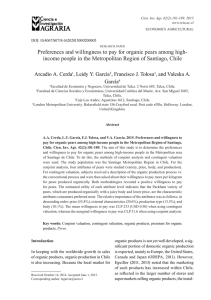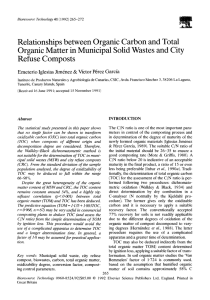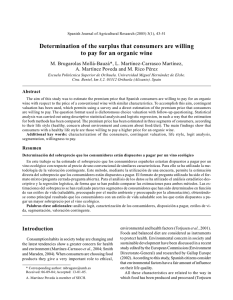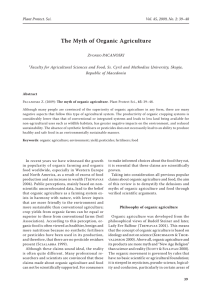Willingness to pay for organic food in Argentina
Anuncio
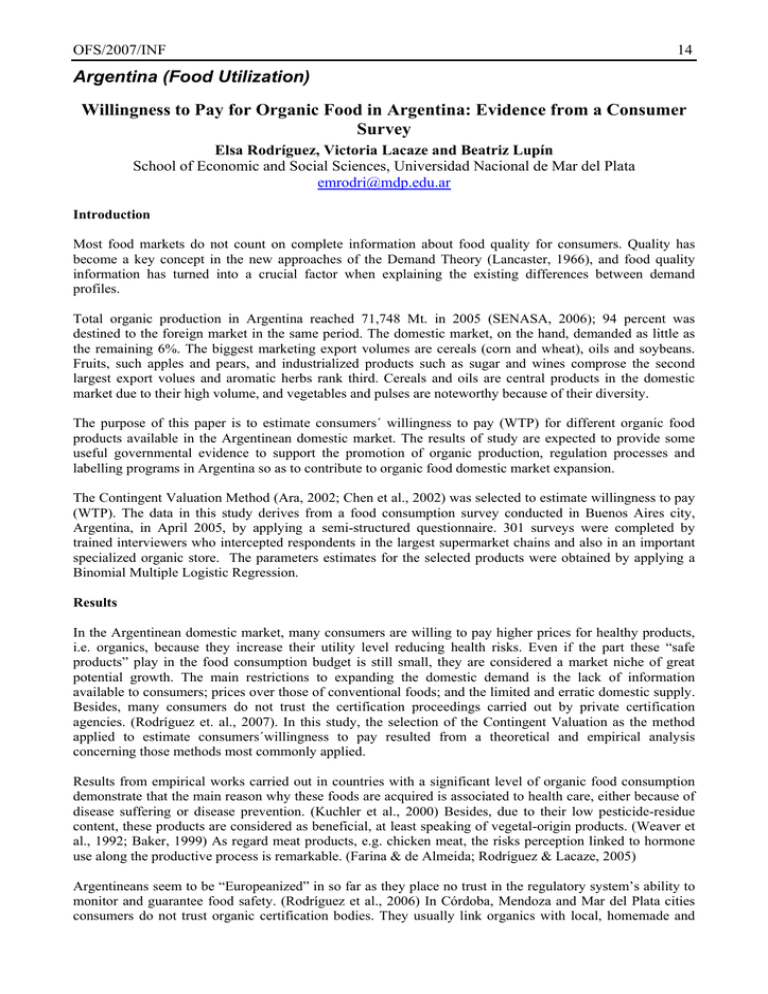
OFS/2007/INF 14 Argentina (Food Utilization) Willingness to Pay for Organic Food in Argentina: Evidence from a Consumer Survey Elsa Rodríguez, Victoria Lacaze and Beatriz Lupín School of Economic and Social Sciences, Universidad Nacional de Mar del Plata emrodri@mdp.edu.ar Introduction Most food markets do not count on complete information about food quality for consumers. Quality has become a key concept in the new approaches of the Demand Theory (Lancaster, 1966), and food quality information has turned into a crucial factor when explaining the existing differences between demand profiles. Total organic production in Argentina reached 71,748 Mt. in 2005 (SENASA, 2006); 94 percent was destined to the foreign market in the same period. The domestic market, on the hand, demanded as little as the remaining 6%. The biggest marketing export volumes are cereals (corn and wheat), oils and soybeans. Fruits, such apples and pears, and industrialized products such as sugar and wines comprose the second largest export volues and aromatic herbs rank third. Cereals and oils are central products in the domestic market due to their high volume, and vegetables and pulses are noteworthy because of their diversity. The purpose of this paper is to estimate consumers´ willingness to pay (WTP) for different organic food products available in the Argentinean domestic market. The results of study are expected to provide some useful governmental evidence to support the promotion of organic production, regulation processes and labelling programs in Argentina so as to contribute to organic food domestic market expansion. The Contingent Valuation Method (Ara, 2002; Chen et al., 2002) was selected to estimate willingness to pay (WTP). The data in this study derives from a food consumption survey conducted in Buenos Aires city, Argentina, in April 2005, by applying a semi-structured questionnaire. 301 surveys were completed by trained interviewers who intercepted respondents in the largest supermarket chains and also in an important specialized organic store. The parameters estimates for the selected products were obtained by applying a Binomial Multiple Logistic Regression. Results In the Argentinean domestic market, many consumers are willing to pay higher prices for healthy products, i.e. organics, because they increase their utility level reducing health risks. Even if the part these “safe products” play in the food consumption budget is still small, they are considered a market niche of great potential growth. The main restrictions to expanding the domestic demand is the lack of information available to consumers; prices over those of conventional foods; and the limited and erratic domestic supply. Besides, many consumers do not trust the certification proceedings carried out by private certification agencies. (Rodríguez et. al., 2007). In this study, the selection of the Contingent Valuation as the method applied to estimate consumers´willingness to pay resulted from a theoretical and empirical analysis concerning those methods most commonly applied. Results from empirical works carried out in countries with a significant level of organic food consumption demonstrate that the main reason why these foods are acquired is associated to health care, either because of disease suffering or disease prevention. (Kuchler et al., 2000) Besides, due to their low pesticide-residue content, these products are considered as beneficial, at least speaking of vegetal-origin products. (Weaver et al., 1992; Baker, 1999) As regard meat products, e.g. chicken meat, the risks perception linked to hormone use along the productive process is remarkable. (Farina & de Almeida; Rodríguez & Lacaze, 2005) Argentineans seem to be “Europeanized” in so far as they place no trust in the regulatory system’s ability to monitor and guarantee food safety. (Rodríguez et al., 2006) In Córdoba, Mendoza and Mar del Plata cities consumers do not trust organic certification bodies. They usually link organics with local, homemade and OFS/2007/INF 15 handmade food, and, therefore organic producers and retailers constitute important credibility sources, attracting relatively more consumers (Rodríguez & Lacaze, 2005). The key factor for organics consumption in Argentina seems to be the concern for a regulatory system. For all the estimated models, even though 74% of the respondents affirm that the regulatory bodies are inefficient, 70% believes that food regulation should be public rather than private. Undoubtedly, current prices play a critical part in WTP determination for these differentiated quality products. In all the estimated models, 75% of the respondents states that they would buy organics more frequently, if they were cheaper. Based on the results of this research, the prices consumers are willing to pay for organic regular milk, whole wheat flour and fresh chicken are below market prices, though near. Hence, if effective prices were slightly reduced, these differences would get reduced as well, and, in consequence, consumers would have greater access to these products of better quality. The WTP estimated for organic leafy vegetables is slightly above the effective market price, thereby fostering optimum growth perspectives for its production, even when the regular supply of these vegetables in the market remains a real challenge for producers. In Argentina, consumers´ perceptions about organic food quality are better WTP´s predictors than other socio-demographic variables such as respondent´s gender or age. (Rodríguez et al., 2006) The better educated consumers, who eat healthy food, and consider food control organisms as ‘inefficient’, are more likely to buy organic products. According to these results, educated people seem to be more exposed to diet and health information sources, and can better understand and process them. While in 2002 organic regular milk seemed to be cheaper than conventional milk, in 2005 the opposite occurred with a 13% price premium. This could be explained by the sharp increase of dairy products since 2003. The same applies to organic leafy vegetables which registered a dramatic rise during 2002-2005. Conclusions To conclude, scarcity as well as high price premiums are identified as the most difficult obstacles to overcome when it comes to domestic consumption expansion in Argentina. The involvement of general food retailers in the organic food market is of major importance and should be encouraged in order to increase organic products market share. Therefore, an increase in production levels is a must together with reductions in production costs and processing and/or trading costs, which, in turn, translate into sale price reductions, and into an increase of organic products consumption. Most countries with lower consumer price premiums have a common national label, and such label recognition by consumers is usually high. As mentioned in other studies, pull strategies should be applied to promote organic market growth. To do so, the organic market actors must convince themselves that there is a growing consumer demand for organic food and that any efforts they make to increase the supply of organic products will enhance their competitiveness; however, a high level of market transparency must be assured. Argentinean current system does not contribute to smallholders’ farms inclusion through regional development programs, thereby streightening the asymmetric distribution of benefits. As consumers claim, research, consumer food education and counselling programs should be further supported. As economists, the challenge for further research is to reinforce our methodological skills, in order to improve more accurate estimations of consumers’ willingness to pay. References Ara, S. (2002). Environmental evaluation of organic rice: A case study in the Philippines. M.S. Thesis, Kobe University, Japan. [Available from the author] URL: http://www.indec.gov.ar/censo2001s2_2/ampliada_index.aspmode=02 Chen, K.; Ali, M.; Veeman, M.; Unterschultz, J. & Le, T. (2002). Relative importance rankings for pork attribute by Asian-origin consumers in California: Applying an ordered Probit Model to choice-bases sample. Journal of Agricultural and Applied Economics, 34 (1): 67-69. Rodríguez, E.; Lacaze, V. & Lupín, B. (2007). Willingness to pay for organic food in Argentina: Evidence from a consumer survey. Contributed paper prepared for presentation at the 105th EAAE Seminar OFS/2007/INF 16 “International Marketing and International Trade of Quality Food Products”, Bologna, Italy, March 8-10,2007.[Online] URL: www.bean-quorum.net/EAAE/EAAE105_Program20070207.pdf Rodríguez, E.; Lupín, B. & Lacaze, V. (2006). Consumers´perceptions about food quality attributes and their incidence in Argentinean organic choices. Poster paper presented at the International Association of Agricultural Economists Conference, Gold Coast, Australia, August 12-18, 2006. URL: http://agecon.lib.umn.edu/cgi-bin/pdf_view.plpaperid=22222&ftype=.pdf Lancaster, K. (1966). A new approach to consumer theory. Journal of Political Economy, LXXIV(2): 132157. Biography Elsa M. Rodríguez Facultad de Ciencias Económicas y Sociales – Universidad Nacional de Mar del Plata Funes 3250, B 7602 AYJ, Mar del Plata, Buenos Aires, Argentina. emrodri@mdp.edu.ar Elsa M. Rodríguez is Economist, and completed the Master of Science degree in Cornell University, Ithaca. NY, USA in 1983. Major in Consumer’s Economics and Housing and Minor in Agricultural Economics. Currently Professor of Agricultural Economics and Director of the Agricultural Research Group since 1992 at the School of Economics and Social Sciences, Universidad Nacional de Mar del Plata, Argentina. President of the Asociación Argentina de Economía Agraria (2003-2005 Period). Ms. Rodriguez’s scientific research focuses on food consumption behavior, consumption of organic and high value products.
